|
|
|
Sort Order |
|
|
|
Items / Page
|
|
|
|
|
|
|
| Srl | Item |
| 1 |
ID:
128568
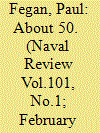

|
|
|
|
|
| Publication |
2013.
|
| Summary/Abstract |
In a series of articles, the author takes a look at cuts, cost and affordability in order to speculate about what could have been and what might be.
|
|
|
|
|
|
|
|
|
|
|
|
|
|
|
|
| 2 |
ID:
130956


|
|
|
|
|
| Publication |
2014.
|
| Summary/Abstract |
In July 2013 the UK's coalition government published "The Civil Service Reform Plan - One Year on", reporting on progress against minister Frances Maude's objectives to shake up the civil service. This followed various reported disagreements between ministers and civil servants over policy implementation, and a research report commissioned by the government from think tank IPPR into lessons from overseas for civil service reform. This trio of short articles reviews the government's proposals from three perspectives: that of the lead author of the IPPR report, a former senior civil servant, and the chair of the House of Commons Public Administration Committee (PASC) which oversees the civil service. The authors take differing views on the proposals, which include introduction of 'extended ministerial offices', and greater control by ministers over choosing their civil servants. Should these be seen as useful next steps, worrying developments, and/or large and important enough to merit a Commission on the civil service, as PASC has suggested?
|
|
|
|
|
|
|
|
|
|
|
|
|
|
|
|
| 3 |
ID:
131763


|
|
|
|
|
| Publication |
2014.
|
| Summary/Abstract |
This article argues that the Aden Insurgency was a pivotal moment in the history of British counter-insurgency. We argue that it was in Aden where the newfound strength of human rights discourse, embodied in Amnesty International, and of anti-colonial sentiment, expressed by the UN General Assembly, forced the British government to pay attention to public perceptions of colonial brutality. Using archival sources, we foreground three episodes in the history of the insurgency to support our argument and to illustrate that the changes witnessed were not the result of 'learning' but of a fundamental shift in the international environment.
|
|
|
|
|
|
|
|
|
|
|
|
|
|
|
|
| 4 |
ID:
131852
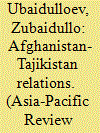

|
|
|
|
|
| Publication |
2014.
|
| Summary/Abstract |
This article attempts to touch upon the relations between Afghanistan and Tajikistan, two neighboring countries, from the historical perspective and the current period. The article analyses the history of Afghanistan-Tajikistan relations during and after the Soviet era, especially during the Afghan Mujahideen's struggle against the Soviet occupational army and Taliban regime in Afghanistan, the Tajikistan civil war of 1992-1997, and after September 11, 2001. In addition, the issues of the ethnic Tajiks in Afghanistan, the violent and vulnerable Tajik-Afghan border, the withdrawal of NATO troops from Afghanistan in 2014 and its impact on Afghanistan-Tajikistan relations, and the new phase of economic relations and an effective cooperation between the both countries are discussed. The article tries to fill the gaps within the body of existing literature and understanding concerning the topic.
|
|
|
|
|
|
|
|
|
|
|
|
|
|
|
|
| 5 |
ID:
133281
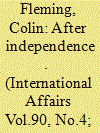

|
|
|
|
|
| Publication |
2014.
|
| Summary/Abstract |
The Scottish government's white paper on independence, Scotland's future, sets out its defence blueprint following a 'yes' vote. It makes clear that its defence plans would be subject to a Strategic Defence and Security Review in 2016, as well as negotiation on the division of assets with London. However, it also provides a strong indication of how it envisages its defence posture as an independent state-a major pillar of which is founded upon strong and continued defence cooperation with the rest of the United Kingdom. Is this a realistic assumption? And, if so, how would it work in practice? Contextualized by the increased emphasis on defence cooperation which sits at the heart of NATO's Smart Defence initiative, as well as the European Defence Agency's 'pooling and sharing' programme, the article assesses the benefits and challenges that might be encountered in a defence cooperation agreement between an independent Scotland and the rest of the United Kingdom in the event of a 'yes' vote in September's referendum.
|
|
|
|
|
|
|
|
|
|
|
|
|
|
|
|
| 6 |
ID:
133979
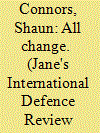

|
|
|
|
|
| Publication |
2014.
|
| Summary/Abstract |
The UK Ministry of Defence's (MoD's) Multi Role Vehicles - Protected (MRV-P) programme is intended to replace around 50% of the current soft-skin Land Rover and Pinzgauer light vehicle fleet with a capability better suited to projected future operational requirements, and a senior defence official has set out from details for the first time.
|
|
|
|
|
|
|
|
|
|
|
|
|
|
|
|
| 7 |
ID:
127871


|
|
|
|
|
| Publication |
2014.
|
| Summary/Abstract |
In order to meet its 2050 target of 80% carbon emissions reduction, the UK is facing a challenge of restructuring its energy system, possibly by introducing more decentralised energy (DE) systems.Following semi-structured interviews, four exemplar international cases have been critiqued in order to investigate the variety and interrelationship of the drivers and barriers involved during their implementation, and then compared with the barriers and drivers that can potentially affect the implementation of similar projects in the UK context. The impacts of the barriers on the outcomes of these projects were evaluated, and recommendations were presented on overcoming these barriers if replicating similar projects in the UK context. Governance drivers play the most significant role, whereas financial drivers (commonly believed to be crucial), are deemed to play a lesser role. Social, governance and financial barriers rather than technological barriers constitute the central problem areas for the increased adoption of DE. The drivers and barriers experienced in the international cases were similar to those anticipated in the UK. The case studies present a high potential for replication and scaling up in the UK context and demonstrate that the increased implementation of DE systems could also enhance social and governance benefits.
|
|
|
|
|
|
|
|
|
|
|
|
|
|
|
|
| 8 |
ID:
127907


|
|
|
|
|
| Publication |
2014.
|
| Summary/Abstract |
This paper introduces a new agent-based model, which incorporates the actions of individual homeowners in a long-term domestic stock model, and details how it was applied in energy policy analysis. The results indicate that current policies are likely to fall significantly short of the 80% target and suggest that current subsidy levels need re-examining. In the model, current subsidy levels appear to offer too much support to some technologies, which in turn leads to the suppression of other technologies that have a greater energy saving potential. The model can be used by policy makers to develop further scenarios to find alternative, more effective, sets of policy measures. The model is currently limited to the owner-occupied stock in England, although it can be expanded, subject to the availability of data.
|
|
|
|
|
|
|
|
|
|
|
|
|
|
|
|
| 9 |
ID:
128738
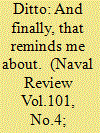

|
|
|
|
|
| Publication |
2013.
|
| Summary/Abstract |
Since I now live in the Gulf, it was a happy coincidence that found me in Portsmouth on 16th July 2013 and therefore able to attend the Centenary Party; and what a splendid affairs it was. I must have taken much work to prepare and I'm sure members will join me in thanking everyone involved.
|
|
|
|
|
|
|
|
|
|
|
|
|
|
|
|
| 10 |
ID:
128602


|
|
|
|
|
| Publication |
2013.
|
| Summary/Abstract |
I'm currently reading a wonderful book about the Battle of Trafalgar. Alright call me anchor faced if you will but don's forget that, as I look out my office window at an expanse of scrubby desert, I need something, a part from the tub of Atlantic sea salt on my desk, to reminder me that I am a seaman and not a Bedouin academic.
|
|
|
|
|
|
|
|
|
|
|
|
|
|
|
|
| 11 |
ID:
128665


|
|
|
|
|
| Publication |
2013.
|
| Summary/Abstract |
There have been many figures, real and literary, who have maintained that there is no such thing as a coincidence. When, therefore, the last edition of NR did not arrive and the same was true for my work colleague, it seemed likely that there was a common explanation.
|
|
|
|
|
|
|
|
|
|
|
|
|
|
|
|
| 12 |
ID:
126540


|
|
|
|
|
| Publication |
2013.
|
| Summary/Abstract |
This article reports on an audience costs experiment embedded into a survey of the British public (N = 2235). We extend previous research into audience costs in three main directions. First, we provide clear and direct evidence that they exist for a second-order democratic power, the United Kingdom. Second, we show that the extent of audience costs varies, and at times substantially, along with features of the crisis situation that have not been examined empirically in this context before. In particular, the type of crisis strongly influences public reactions both to bluffing in general and to the wisdom or otherwise of escalating crises before backing down. While audience costs do appear to exist for a UK Prime Minister, he or she cannot inflate them by moving up the escalation chain. Rather, a limited use of force tends to mitigate these costs among the British public because it appears to them a more consistent strategy. Third, we show that public disapproval of a failed bluffing strategy is stronger among the more politically engaged, increasing the likelihood that audience costs will be paid at the ballot box.
|
|
|
|
|
|
|
|
|
|
|
|
|
|
|
|
| 13 |
ID:
130681
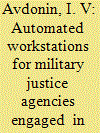

|
|
|
|
|
| Publication |
2014.
|
| Summary/Abstract |
The article examines trends in workstation use by military investigators engaged in crime detection and investigation. It explored algorithms to maximize automated workstations (AWS) potential in the work of detecting and investigating crimes. Trends in using AWS discussed include legal information systems used by the U.S., Great Britain, and Italy as well as software programs and sharing of electronic documents by investigator, head of the agency, prosecutor and the expert.
|
|
|
|
|
|
|
|
|
|
|
|
|
|
|
|
| 14 |
ID:
131723
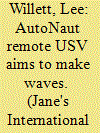

|
|
|
|
|
| Publication |
2014.
|
| Summary/Abstract |
UK based most autonomous vessels (AV) has demonstrated AutoNaut, it new wave-powered unmanned surface vessels (USV), developed as a long - endurance, low signature, autonomous monitoring and surveillance platform.
|
|
|
|
|
|
|
|
|
|
|
|
|
|
|
|
| 15 |
ID:
131735
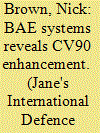

|
|
|
|
|
| Publication |
2014.
|
| Summary/Abstract |
BAE systems hagglunds has confirmed that it is currently running trails of a hard kill defensive aid systems abroad a CV90 infantry fighting vehicles (IFV) and plans to roll out an upgrade roadmap for the vehicle family at the Eurostory defence exhibition held in Paris on 16-20 June.
|
|
|
|
|
|
|
|
|
|
|
|
|
|
|
|
| 16 |
ID:
130702
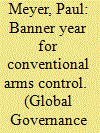

|
|
|
|
|
| Publication |
2014.
|
| Summary/Abstract |
THE CONTROL OF CONVENTIONAL ARMS HAS OFTEN SEEMED THE POOR COUSIN of the global efforts to control weapons of mass destruction (WMD). Since the advent of the atomic era, the focus of arms control and disarmament activity has been overwhelmingly on nuclear weapons and their lesser, if still ugly, stepsisters of biological and chemical weapons. The initial multilateral arms control agreements concerned themselves with limits on the testing of nuclear weapons and, shortly thereafter, with their nonproliferation (e.g., the Nuclear Nonproliferation Treaty of 1968). Bilateral US-Soviet/Russian arms control arrangements also predominantly dealt with the reduction of strategic nuclear forces and restraints on deployments of defenses against (nuclear tipped) ballistic missiles. Efforts to reduce major conventional weapon systems were also taken up in the 1980s in the context of negotiations
between the opposing alliances of NATO and the Warsaw Pact, eventually culminating in the Treaty on Conventional Forces in Europe (CFE Treaty) of 1989. This treaty provided for a massive reduction in the conventional forces that had confronted each other for years in Central Europe and established a new, far more stable security order on the continent. Even the CFE Treaty, however, tended to be overshadowed by other major disarmament agreements concluded in those heady post-Cold War days: the Intermediate Nuclear Forces Treaty (1987), Chemical Weapons Convention (1993), Comprehensive (Nuclear) Test Ban Treaty (1996), and various US-Russian bilateral strategic nuclear arms accords of the 1990s and early 2000s (e.g., the Strategic Arms Reduction Treaty and the Strategic Offensive Reductions Treaty).
|
|
|
|
|
|
|
|
|
|
|
|
|
|
|
|
| 17 |
ID:
132917


|
|
|
|
|
| Publication |
2014.
|
| Summary/Abstract |
The Beagle Channel crisis (1977-1984) unfolded in a global political context. In other words, it was never solely a bilateral matter between Argentina and Chile, as many analyses have suggested. From the international arbitration to the participation of a third actor (the Vatican), the role of the United States, the Falklands war and the United Kingdom, the Beagle crisis had pronounced regional and international dimensions. Domestic structures and international conditions affected the Argentinian and Chilean foreign policies to different degrees. The Beagle crisis resolution has been explained by reference to the key role played by the Vatican. However, recently declassified US documents and interviews with key actors reveal a different story. International sanctions for human right violations were affecting both countries' leverage in the international community and creating internal political problems. This finding suggests that both countries were keen to use mediation as a strategy to remove human rights violations from the US agenda.
|
|
|
|
|
|
|
|
|
|
|
|
|
|
|
|
| 18 |
ID:
130945
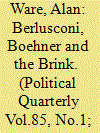

|
|
|
|
|
| Publication |
2014.
|
| Summary/Abstract |
In the early autumn of 2013 large minorities in Italy and the United States fermented crises that badly disrupted the government of the two countries. These cases were widely understood as instances of dysfunction in established democracies that would rarely be replicated elsewhere. However, while all the conditions that generated the crises are unlikely to be evident in other established democracies three important factors that caused the disruptions in the American and Italian political processes are also sources of political conflict in Britain. They are the powers of the second legislative chamber, the weakening links between parties and social groups, and the redrawing of electoral boundaries. All of them present problems for political reform in Britain, and understanding the role they played in the two political crises of 2013 is important for future reform in Britain.
|
|
|
|
|
|
|
|
|
|
|
|
|
|
|
|
| 19 |
ID:
133349


|
|
|
|
|
| Publication |
2014.
|
| Summary/Abstract |
By late 2020 the UK RN will have replaced its legacy helicopter fleet with new or upgraded rotocraft, Richard Scott charts the progress of the wildcat and Merlin programmes.
|
|
|
|
|
|
|
|
|
|
|
|
|
|
|
|
| 20 |
ID:
131634


|
|
|
|
|
| Publication |
2014.
|
| Summary/Abstract |
This article examines the implications of Scottish independence for the UK's nuclear posture. It is argued here that a vote for independence will critically undermine this posture. Since the UK nuclear force operates entirely out of Scotland, and since the Scottish government continues to assert its intention to see nuclear weapons removed from an independent Scotland, it is overwhelmingly likely that a 'Yes' vote will prompt a demand for the drawdown of the UK nuclear force in Scotland. If it wished to maintain its nuclear capability, the UK government would then have to make alternative basing arrangements. It is argued here that a host of legal, financial and political difficulties may preclude any such relocation and that Downing Street may ultimately be left with little option but to surrender the UK's nuclear capability. This article concludes that far from weakening the UK, a surrendering of its nuclear posture would result in a stronger and more functional UK military footprint and would bolster the UK's standing in the international arena.
|
|
|
|
|
|
|
|
|
|
|
|
|
|
|
|
|
|
|
|
|